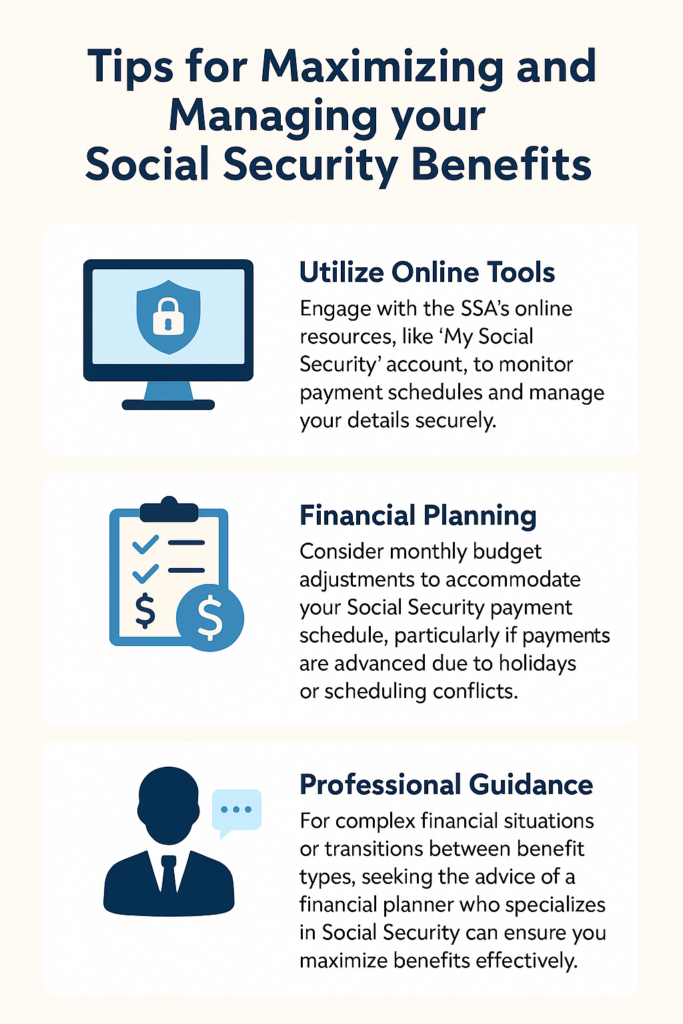Social Security Disability Insurance (SSDI) payments serve as a critical lifeline for many Americans that are unable to work due to a qualifying disability. The Social Security Administration (SSA) has released the official payment amounts for 2026, including adjustments for the cost of living (COLA), up by 2.8%.
The exact SSDI payment that you receive depends on your lifetime earnings and work history. With the COLA adjustment, monthly payments have increased to help beneficiaries combat inflation.
The average monthly payment for 2026 is approximately $1,630.
Payment Schedule
- Birth Date on 1st – 10th: Payments are deposited on the second Wednesday of each month.
- Birth Date on 11th – 20th: Payments are deposited on the third Wednesday of each month.
- Birth Dare on 21st – 31st: Payments are deposited on the fourth Wednesday of each month.
For those that receive Supplemental Security Income (SSI) along with SSDI, payments are typically made on the first day of each month, unless it falls on a weekend or holiday.
How SSDI Payments Are Determined
The SSA calculates SSDI payments using a formula based on your average indexed monthly earnings (AIME). The 2026 adjustment reflects an increase due to inflation, ensuring that beneficiaries maintain purchasing power.
What to Do if Your SSDI Payment is Delayed
- Check your bank account: Verify the deposit date.
- Contact the SSA: Call 1-800-772-1213 to report issues.
- Set up Direct Deposit: To avoid future delays, consider enrolling in direct deposit via the SSA website.
Exceptions to the Standard SSDI Payment Schedule Include:
- Payment to children or spouses who receive benefits based on someone else’s work record will be paid on the same day as that primary beneficiary.
- Individuals who receive both Social Security benefits and SSI will receive Social Security on the 3rd and SSI on the 1st.
- Individuals whose payment date falls on a federal holiday or weekend will be paid on the weekday immediately prior.
- SSI recipients receive benefits on the first of the month unless the date falls on a weekend or a holiday.
- Special circumstances (such as veterans, federal employees, or individuals receiving benefits under other federal programs) may have different payment dates.
Factors Influencing Payment Timing
- Direct Deposit Versus Paper Check: Almost all beneficiaries receive their payments through direct deposit, which is more reliable and secure than paper checks.
- Bank Processing Times: Even with direct deposits, banks may require additional processing time, influencing when funds are available in a beneficiary’s account.
Tips for Maximizing and Managing your Social Security Benefits

Utilize Online Tools: Engage with the SSA’s online resources, like “My Social Security” account, to monitor payment schedules and manage your details securely.
Financial Planning: Consider monthly budget adjustments to accommodate your Social Security payment schedule, particularly if payments are advanced due to holidays or scheduling conflicts.
Professional Guidance: For complex financial situations or transitions between benefit types, seeking the advice of a financial planner who specializes in Social Security can ensure you maximize benefits effectively.
Social Security Fairness Act: Windfall Elimination Provision (WEP) and Government Pension Offset (GPO) Update
The Act ends the Windfall Elimination Provision (WEP) and Government Pension Offset (GPO). These provisions reduced or eliminated the Social Security benefits of over 3.2 million people who receive a pension based on work that was not covered by Social Security (a “non-covered pension”) because they did not pay Social Security taxes.
SSA has taken several steps to tell people what it is doing to implement the Act and to provide important updates to avoid unnecessary calls or visits while we finalize the implementation plan. SSA:
- Created this Social Security Fairness Act webpage to explain what the Act does, what steps—if any—someone should take, and other helpful information. The webpage offers the option to subscribe to receive alerts when SSA updates the webpage, eliminating the need to return to the webpage to check for updates. SSA encourages media and third-party groups to direct people to this webpage for information.
- Added upfront messaging to its National 800 Number about the Act so callers do not need to wait to speak to a representative.
- Plans informational meetings with state retirement boards, labor unions, financial planners, human resources professionals, and the advocate community.
At Benefits.com, we are here to help you navigate the process and receive the benefits you deserve. Begin today by taking our free eligibility quiz.
 Benefits.com Advisors
Benefits.com Advisors
With expertise spanning local, state, and federal benefit programs, our team is dedicated to guiding individuals towards the perfect program tailored to their unique circumstances.
Rise to the top with Peak Benefits!
Join our Peak Benefits Newsletter for the latest news, resources, and offers on all things government benefits.


















